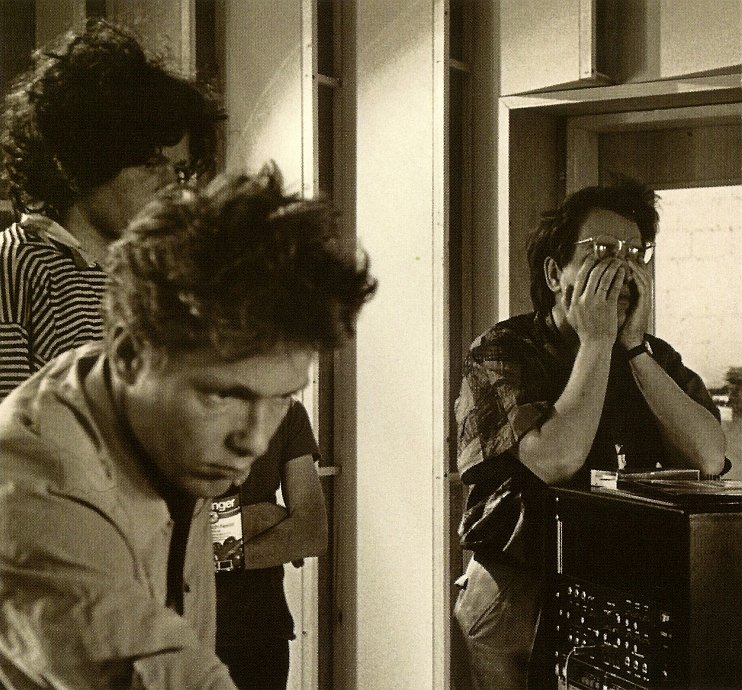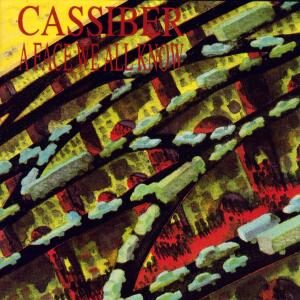Pynchon Music: Cassiber
Tale of a Dictator
Cassiber (1982-1992)
In 1988, a “Rock In Opposition” group named Cassiber (German composer and music-theatre director Heiner Goebbels, Christoph Anders, and British percussionist Chris Cutler) wrote and recorded A Face We All Know, an avant-garde album that incorporate texts from Gravity’s Rainbow.
According to Chris Cutler:
The CD embodies an implied narrative, could be a sleep deprived dictator, maybe locked in a radio station, partly remembering, partly hallucinating while the old order goes down in flames outside. The Pynchon focused this—effectively speaking for ‘the outside’. (I can’t tell you how reluctant I am even to write this. I hate to limit a work—please take this merely as a possible orientation). It was realized in 1988 in East Berlin, before the epochal changes of ‘89—a curious mingling of fiction and fact. The title of course is from one of the Thomas Pynchon extracts, and is a narrative indication.” Chris Cutler also writes: “I wrote ‘A Face’ (the narrative idea and my text) in Newfoundland in, I think, 1987, two years before the East block crumbled. Heiner and Christoph proposed incorporating the Pynchon texts. About the way the CD was conceived and created, Cutler states that it began “with no thought of Pynchon I’m afraid. Heiner and Christoph proposed the use of the Gravity’s Rainbow extracts half way through the composition process. So, it can’t really be said that that the CD was inspired by or was in any way a reaction to Gravity’s Rainbow or Thomas Pynchon, though the Pynchon text is indispensable to it in its final form. We cleared the use of the texts, of course, and sent a copy of the finished work to Pynchon’s agent.
Heiner Goebbels writes:
We (a three musician art-rock group called Cassiber, with the British drummer Chris Cutler, Christoph Anders and me) made up a number of songs for the album A Face We All Know, using texts taken from Gravity’s Rainbow—especially from its very beginning and very end; songs like “A Screaming Comes Across the Sky,” “Under Archways,” “They Began to Move,” “Start the Show,” etc. The CD came out in ‘89, and the most surprising fact about it was for me, that—not knowing who the author was or where he author lived, but still in tune with a lot of mysterious information about him, I got the license to use his words within a day or two by fax, through his New York publisher.
Text
A Face We All Know
Texts by Chris Cutler (tracks 1-5, 11-17) and Thomas Pynchon (tracks 7-10, 14), except 6 by Christoph Anders and German texts (tracks 8, 12, 14) by Rainald Goetz. The Pynchon passages are marked by page numbers from the 1973 Viking/ Penguin edition of Gravity’s Rainbow.
I.
This was the way it was. I don’t remember. I took notes. We knew nothing. People came and went. One night we were watching that—the programme about the idiot who loses everything…
It was 2 o’clock in the morning. I’d drunk too much and fallen asleep in a chair. I woke in a panic. the TV was howling. My mouth was dry. I was burning up. I was burning. We were going into a tunnel we would never come out of. I knew. It was the end.
I thought I’d gone crazy. All the Old Gods had come back. As big as houses. I was twelve. All I remember is the stink: Ambrosia, sour on their breath like rancid milk. But I learned their secret: they vomited their own space.
I remember everything. I see it all before my eyes. Even the words. In letters that roll like credits when a film is over. They float in front of me. When I close my eyes I see what I think. And the words. In terrible colours.
II.
The rhythmic clapping resonates inside these walls, which are hard and glossy as coal: Come-on! Start-the-show!
Come-on! Start-the-show! The screen is a dim page spread before us, white and silent. The film has broken, or a projector bulb has burned out … The last image was too immediate for any eye to register … And in the darkening and awful expanse of screen something has kept on, a film we have not learned to see … it is now a closeup of the face, a face we all know. (GR p. 760)
A screaming comes across the sky. It has happened before, but there is nothing to compare it to now. It is too but it’s all theatre. There are no lights inside the cars. No light anywhere. Above him lift girders …. and glass somewhere far above that would let the light of the day through. But it’s night. He’s afraid of the way the glass will fall—soon—it will be spectacle: down in total blackout, without one glint of light, only great invisible crashing. (GR p. 3)
They go in under archways, secret entrances of rotten concrete that only looked like loops of an underpass … and it is poorer the deeper they go … ruinous secret cities of poor, places whose names he has never heard … the walls break down, the roofs get fewer and so do the chances for light. The road … more broken, cornering tighter and tighter until all at once, much too soon, they are under the final arch: brakes grab and spring terribly… (GR p. 3)
They have begun to move. They pass In line, out of the main station, out of downtown, and start pushing into older and more desolate parts of the city. Is this the way out ? Faces turn to the windows, but no one dares ask, not out loud. Rain comes down. (GR p. 3)
III.
This was the way it was. I don’t remember. I took notes. We knew nothing. People came and went. One night we were watching that—the programme about the idiot who loses everything….
It was 2 o’clock in the morning. I’d drunk too much and fallen asleep in a chair. I woke in a panic. The TV was howling. My mouth was dry. I was burning up. I was burning. We were going into a tunnel we would never come out of. I knew. It was the end.
I thought I’d gone crazy. All the old Gods had come back. As big as houses. I was twelve. All I remember is the stink. Ambrosia, sour on their breath like rancid milk. But I learned their secret: they vomited their own space.
I remember everything. I see it all before my eyes. Even the words. In letters that roll like credits when a film is over. They float in front of me. When I close my eyes I see what I think. And the words. In terrible colours.
Time gets faster as we get better at it. At the end we can jump right into the middle. Then we go…..somewhere else. And then …. what ? It’s never quiet. I went away. I went as far as I could. I
couldn’t believe it. It was worse than the traffic, worse than the chatter, worse than anything: crash, crash, crash, crash, crash—my own blood crashing in my veins. It’s all too expensive. It all costs too much. I won’t pay, I can’t pay.
You want to know my philosophy, my hopes and fears, my outlook on life? I was there once. You can see it all there.
I was old when I was young. I was robbed. I was cheated. O yes, they loved my book. Everybody read it. I was right after all. But I stopped caring when nothing resisted any more. Now I keep awake with pills and injections because….lf I sleep…we have to be on our guard…and sleep, I have always known this, is alien – dangerous. A little father. A little farther.
After the dark, the light. Everybody knows that.
Additional Information
Track Listing
Part I.
1. This Was The Way It Was (0:51)
2. Remember (2:52)
3. Old Gods (0:27)
4. 2 o’clock in the Morning (2:36)
5. Philosophy (1) (0:06)
6. Gut (3:46)
Part II.
7. Start the Show (3:02)
8. A Screaming Comes Across the Sky (3:12)
9. They Go In Under Archways (4:12)
10. They Have Begun to Move (3:32)
Part III.
11. Time Gets Faster (0:27)
12. It’s Never Quiet (2:25)
13. Philosophy (2) (0:04)
14. A Screaming Holds (1:57)
15. Philosophy (3) (0:32)
16. I Was Old (3:54)
17. The Way It Was (5:06)
18. To Move (2:53)
1. This Was The Way It Was (0:51)
2. Remember (2:52)
3. Old Gods (0:27)
4. 2 o’clock in the Morning (2:36)
5. Philosophy (1) (0:06)
6. Gut (3:46)
Part II.
7. Start the Show (3:02)
8. A Screaming Comes Across the Sky (3:12)
9. They Go In Under Archways (4:12)
10. They Have Begun to Move (3:32)
Part III.
11. Time Gets Faster (0:27)
12. It’s Never Quiet (2:25)
13. Philosophy (2) (0:04)
14. A Screaming Holds (1:57)
15. Philosophy (3) (0:32)
16. I Was Old (3:54)
17. The Way It Was (5:06)
18. To Move (2:53)
Musicians
Christoph Anders—singing, sampling keyboard, guitar.
Chris Cutler—drums, electrics, voice.
Heiner Goebbels—keyboards, sampling, Guitar on track 16, bass, computerwork.
Music by Heiner Goebbels and Christoph Anders, except 6 by Rene Lussier and 7 by Christoph Anders. Arangements by Cassiber.
Engineered by George Morawietz, assisted by Uwe Zeigenhagen. Special thanks to Georg Katzner.
Chris Cutler—drums, electrics, voice.
Heiner Goebbels—keyboards, sampling, Guitar on track 16, bass, computerwork.
Music by Heiner Goebbels and Christoph Anders, except 6 by Rene Lussier and 7 by Christoph Anders. Arangements by Cassiber.
Engineered by George Morawietz, assisted by Uwe Zeigenhagen. Special thanks to Georg Katzner.
Cassiber’s A Face We All Know was originally released by ReR Megacorp in London, and distributed in the US by Cuneiform Records. Information about Cassiber was first brought to the attention of Spermatikos Logos by Sanjay Kumar, who said: “I played keyboards in a couple of bands called Utotem and 5uu’s, whose music is in a similar vein [to Cassiber’s], although without the improvisation. In fact, I recall meeting Heiner Goebbels in Frankfurt, Germany, in 1990 at an art rock festival where Utotem gave its first European performance.”
Additional Information
Cassiber Bandcamp Page — You can listen to and order A Face We All Know at Cassiber’s Bandcamp page.
Cassiber Wikipedia Page — You can read more about Cassiber on Wikipedia.
Cassiber Discog Page — Collects album covers and information on Cassiber’s releases.
Cuneiform Records Page — You can also order A Face We All Know directly from Cuneiform Records.
Heiner Goebbels Homepage — The official Web site of German composer Heiner Goebbels.
Chris Cutler Homepage — The official Web site of Chris Cutler, drummer for countless amazing RIO bands.
Pynchon on Record
Return to the main music page
Authors: Dr Larry Daw, Sanjay Kumar & Allen B. Ruch
Last Modified: 6 November 2021
Main Pynchon Page: Spermatikos Logos
Contact: quail(at)shipwrecklibrary(dot)com
Last Modified: 6 November 2021
Main Pynchon Page: Spermatikos Logos
Contact: quail(at)shipwrecklibrary(dot)com



